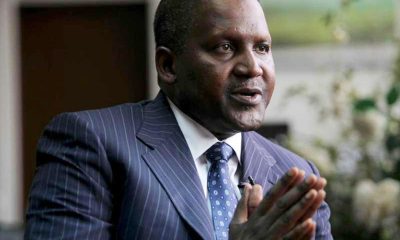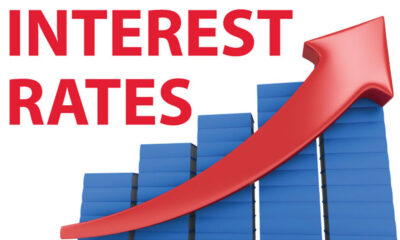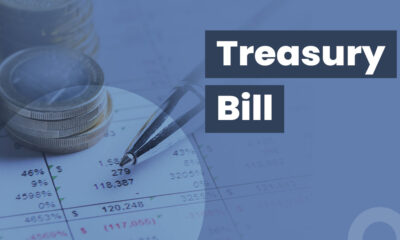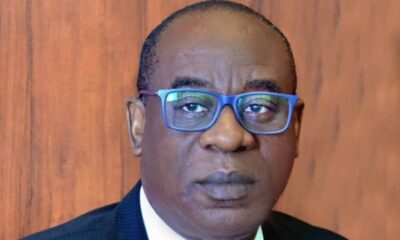Business
Interest rate on Treasury Bills drops, subscriptions more than double

Interest rate on Treasury Bills drops, subscriptions more than double
The Central Bank of Nigeria (CBN) has recorded a significant influx of demand in the latest Nigerian Treasury Bills (NTB) auction conducted on September 11, 2024, with total subscriptions reaching N563.17 billion across the three tenors.
This marks a notable appetite for risk-free assets, even as the offered amount stood at N161.88 billion, revealing an oversubscription rate of 248% across the tenors.
However, in comparison to the previous auction on September 4, 2024, where N1.13 trillion was subscribed, the current auction shows a 50.14% decrease in total subscriptions.
On the allotment side, the total amount of N161.88 billion allotted in this auction reflects a 30.59% reduction compared to the N233.31 billion allotted in the prior auction.
Breakdown of the Bids
Despite this dip, the appetite for Treasury Bills (T-Bills) remains robust, particularly in the 364-day tenor.
- 91-Day Tenor: The CBN offered N6.78 billion for the 91-day bills, but investor demand far exceeded expectations, with a subscription of N17.80 billion, marking an oversubscription of 162.51%. The CBN eventually allotted N10.84 billion, which is a 37.5% increase from the offer size. However, this was still lower than the allotment in the last auction.
READ ALSO:
- Nigeria’s paralympians get allowance, rewards, gold medalists $1,500, silver $1,000, bronze $500
- Naira depreciates to N1,655/$ in parallel market
- Why those criticising Convenant University fee may incur God’s wrath – Oyedepo
- 182-Day Tenor: The 182-day bills, offered at N4.92 billion, received a subscription of N6.16 billion, reflecting an oversubscription of 25.2%. The final allotment was N2.52 billion, representing a 48.8% decrease in the amount offered.
- 364-Day Tenor: As is typical, the 364-day bills drew the most significant interest, with an offer size of N150.18 billion. The tenor saw a massive subscription of N539.21 billion, nearly 359% above the offer size. The CBN allotted N148.52 billion, indicating a 1.1% decrease in the amount offered. Despite the large demand, the allotment remained close to the initial offer size.
Breakdown of the Rates
The bid rates reflected the competitive environment for the three tenors. Investors submitted bid rates ranging between 15.00% to 21.00% for the 91-day bills, 15.55% to 19.10% for the 182-day bills, and 17.00% to 24.00% for the 364-day bills. Despite the broad range of bid rates, the CBN remained selective with stop rates declining across all tenors in comparison to previous auctions.
- 91-Day Bills: The stop rate for the 91-day bills dropped to 16.63%, down from 17.00% in the previous auction, marking a 0.37% decline.
- 182-Day Bills: Similarly, the stop rate for the 182-day bills fell to 17.00%, down from 17.50%, reflecting a 0.50% decrease.
- 364-Day Bills: The stop rate for the 364-day bills declined by 0.35% to 18.59%, compared to 18.94% in the previous auction.
The decline in stop rates is indicative of the CBN’s effort to control the overall yield curve, despite strong investor demand.
Investors remained attracted to the Treasury Bills due to their relatively high true yields, especially in light of persistent inflationary pressures. The true yields for this auction were:
- 17.36% for the 91-day tenor
- 18.59% for the 182-day tenor
- 22.84% for the 364-day tenor
These returns, particularly for the 364-day bills, offer competitive compensation for investors seeking stable income in a volatile economic environment.
Interest rate on Treasury Bills drops, subscriptions more than double
Nairametrics
Business
CBN reintroduces controversial cybercrime levy on all e-transactions

CBN reintroduces controversial cybercrime levy on all e-transactions
Bank customers of several commercial banks are in a state of confusion currently following the recent release of the fiscal guidelines of the Central Bank of Nigeria (CBN) which revealed that it will continue to enforce a reduced 0.005% levy on all electronic transactions.
The bank in its Monetary, Credit, Foreign Trade, and Exchange Policy Guidelines for Fiscal Years 2024-2025 document, revealed that as part of its 2024-2025 fiscal year guidelines, reaffirmed its commitment to this charge, requiring banks and other financial institutions to deduct the levy from all electronic transactions.
Scrutinizing the document, Daily Sun observed that the percentage has been reduced from 0.5% earlier announced in May 2024 to 0.005% in the new guidelines.
The apex bank noted that the levy is mandated by the Cybercrime (Prohibition, Prevention, etc.) Act of 2015 and added that the revenue generated from the levy supports a cybersecurity fund aimed at bolstering Nigeria’s defense against cyber threats, particularly in the banking sector. “The CBN shall continue to enforce the payment of the mandatory levy of 0.005% on all electronic transactions by banks and other financial institutions, in accordance with the Cybercrime (Prohibition, Prevention, etc.) Act, 2015”, it said.
The CBN’s guidelines also include provisions to ensure banks, Other Financial Institutions (OFIs), and Payment Service Providers (PSPs) comply with minimum cybersecurity standards, such as appointing Chief Information Security Officers (CISOs). These requirements stem from a 2022 risk-based cybersecurity framework that targets the growing threat of cyber attacks.
READ ALSO:
- Osun: Police arrest suspected Yoruba Nation members
- Suspected car thief nabbed in Niger State
- Police arrest DSP, inspector over manhandling of Lagos elderly woman in viral video
It will be recalled that the introduction of the levy had sparked controversy, with critics arguing that it adds unnecessary costs to businesses and could fuel inflation. The Centre for the Promotion of Public Enterprise (CPPE) and the Nigerian Association of Chambers of Commerce, Industry, Mines, and Agriculture (NACCIMA) had urged the government to cap the levy to mitigate its economic impact.
In response to these criticisms, the Federal government, through the Minister of Information, and the Federal House of Representatives called for a suspension of the levy pending further review.
Similarly, the CBN pulled the plug on the collection of levy, but the latest guidelines suggest that the CBN is determined to press forward with the levy despite the opposition.
An economic experts, who did not want his name printed, stated that the CBN could have released such guidelines as part of broader measures aimed at bolstering cybersecurity across financial institutions, especially given the rise in cyber attacks targeting the financial sector.
He however stated that it would be unusual for a central bank to impose such levies directly, as cybersecurity measures are generally handled through regulatory requirements or sector-specific compliance measures.
“I have looked at the guidelines too and I am a bit confused as to whether this has been reviewed thoroughly by the Federal Executive Council because the confusion could arise from how these guidelines were communicated or interpreted by different stakeholders like me.
Also, like I had said before, financial institutions, businesses, and perhaps even customers could be affected by this levy, depending on how it’s structured. Hence, further clarification from the CBN or the Federal Executive Council may be necessary to resolve the confusion surrounding the implementation of the levy”, he said.
CBN reintroduces controversial cybercrime levy on all e-transactions
Business
Suspend VAT, other policies impoverishing Nigerians – SMEs tell FG

Suspend VAT, other policies impoverishing Nigerians – SMEs tell FG
The National Association of Small and Medium Scale Enterprises (NASME) and financial experts have called on the Federal Government (FG) to suspend any new policy that may further impoverish Nigerians.
The unanimous call was made by respondents in separate interviews with the News Agency of Nigeria (NAN) in Ibadan on Tuesday.
The interview focused on the need to stabilise the economy as an increase in Value Added Tax (VAT) is being anticipated from 7.5 per cent to 10 per cent.
The Oyo State chairman NASME, Prince John Karunwi, said VAT, being a consumer tax, would make prices of goods and services shoot up.
According to him, the increase will deplete consumers’ purchasing power and reduce the quantity of items they can buy.
Karunwi said that the present situation had left most Nigerians without disposable income.
“The situation now is that after transportation, maybe people have little for feeding.
“If they now discover that for some certain products, the prices will go high, the demand for products that are not essential will, definitely, drop,” said the chairman.
He said the government should be patient and allow the economy to stabilise despite its drive to increase its internally generated revenue.
READ ALSO:
- Salary: FG vows to prosecute private employers paying below N70,000
- American govt approves Elon Musk’s Neuralink brain chip to restore vision
- Man remanded for allegedly defiling stepdaughter in Benue
An economist, Samson Olalere, said the idea to increase VAT at this point would further deepen the hardship of the common man.
According to him, people are already grumbling about the unwarranted fuel price increase and the high cost of living, as the new minimum wage increase is grossly inadequate.
He said the government should look inward and come up with ideas that would benefit the populace and reduce the hunger of common Nigerians.
“I say no to the increase in VAT. It is an abuse of the sensitivity of Nigerians,” said the economist.
Olalere wondered why the common Nigerian would be asked to sacrifice, tighten his belt, and keep faith in the government without enough consideration for him from the same government.
A financial expert, Sola Famakinwa, corroborated the opinions of others that an increase in VAT would amount to an increase in the prices of goods and services.
“There is no way the manufacturing industries would bear the cost of increased VAT; it would be passed down to the consumers.
“If what we hear about the proposed VAT increment is true, I do not think Nigerians can bear to have more burden added to their shoulders now,” Famakinwa said.
He noted that the government needed to reduce the economic hardship by introducing subsidies for necessities that directly affect Nigerians, considering that not all are government workers.
Recall that VAT was increased from 5 per cent to 7.5 per cent on Feb. 1, 2020.
However, the Presidential Committee on Fiscal Policy and Tax Reforms recently recommended an increase to 10 per cent from 2025, and to 15 per cent by 2027 or 2030.
Suspend VAT, other policies impoverishing Nigerians – SMEs tell FG
Business
Nigeria positioned to lead $7.7tn halal market – Shettima

Nigeria positioned to lead $7.7tn halal market – Shettima
Vice President Kashim Shettima has projected that Nigeria is on the path to becoming a major player in the global halal economy, which is expected to reach a market value of $7.7 trillion by 2025.
Speaking during the Halal Economy Stakeholders Engagement Programme at the banquet hall of the Presidential Villa in Abuja on Wednesday, Shettima said Nigeria’s demographic and economic size provide a strong foundation for positioning the country as a key player in the halal market.
Shettima highlighted the importance of reassessing the nation’s strengths and addressing its weaknesses to achieve this economic milestone.
He stated that the engagement with international stakeholders will help develop a comprehensive halal ecosystem and strategies that will allow Nigeria to tap into high-value global markets.
He praised the private sector for its contributions, especially in the financial sector, and called for further collaboration to deliver a robust halal economy.
READ ALSO:
- Major US labour union declines to endorse Harris, Trump
- 20 killed, 450 injured in second wave of blasts in Lebanon
- FG mutes new system against fraud, to enhance identity verification
He also urged stakeholders to support the administration of President Bola Ahmed Tinubu in creating a thriving halal ecosystem.
Shettima further noted the importance of attracting international investment through summits, roadshows, and business matchmaking events, emphasising that regional trade expansion via the African Continental Free Trade Area (AfCFTA) offers Nigeria a platform to become a leading supplier of halal goods and services across Africa.
Aliyu Bunu Sheriff, the Special Assistant to the President on Export Expansion, highlighted the economic potential of the halal sector.
He explained that increasing Nigeria’s halal exports to countries in the Organisation of Islamic Cooperation (OIC) from 2% to 6% over the next four years could boost the country’s GDP by $548 million.
Senator Abubakar Kyari, Minister of Agriculture and Food Security, provided key statistics, noting that Nigeria’s domestic spending on halal products and services was approximately $107 billion in 2022.
Nigeria positioned to lead $7.7tn halal market – Shettima
-

 Business3 days ago
Business3 days agoDangote refinery to transport 75% of fuel locally by sea
-

 metro2 days ago
metro2 days agoFour burnt to death, eight others injured in Ore-Ijebu Ode road crash
-

 Politics2 days ago
Politics2 days agoWhy I’ll work against Obi as running mate – Aisha Yesufu
-

 metro2 days ago
metro2 days agoUpdated: Controversial church testimony occurred in a dream, says Lord’s Chosen
-

 metro2 days ago
metro2 days agoLady laces food with laxatives to know those eating it
-
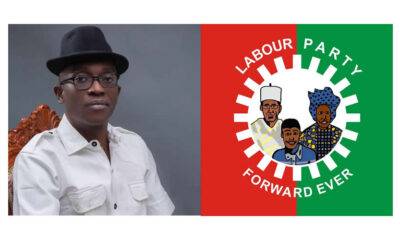
 Politics2 days ago
Politics2 days agoWe no longer recognise Abure as Labour Party chairman – INEC
-

 Opinion1 day ago
Opinion1 day agoOgun Waterside: Path to political recovery
-
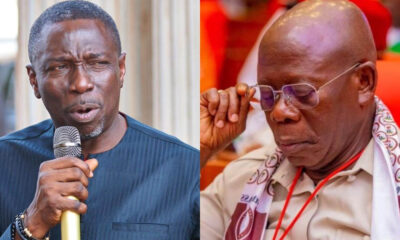
 News2 days ago
News2 days agoIghodalo sues Oshiomhole for N20bn ahead of Edo election

